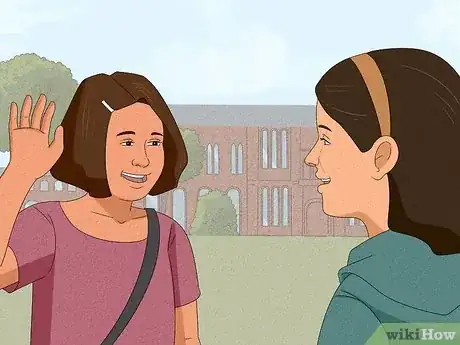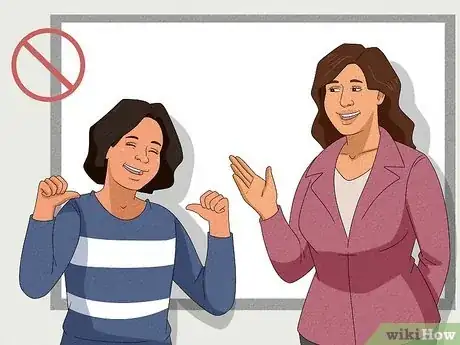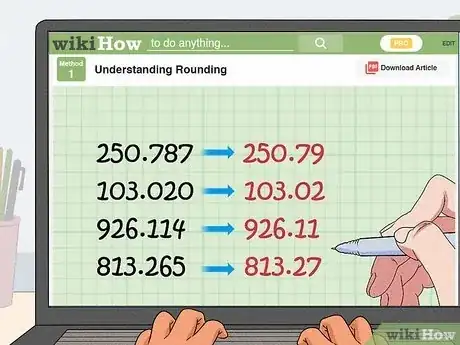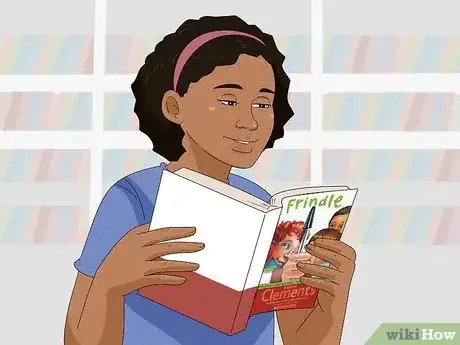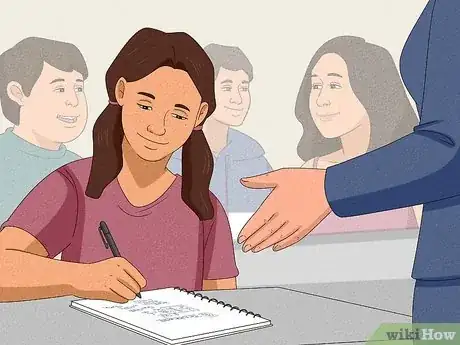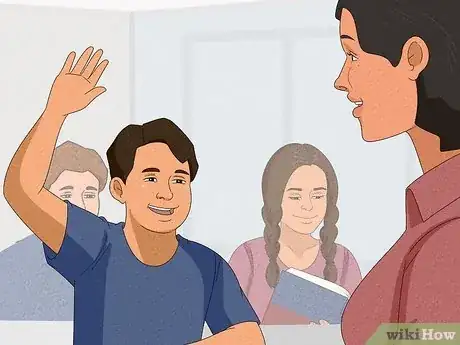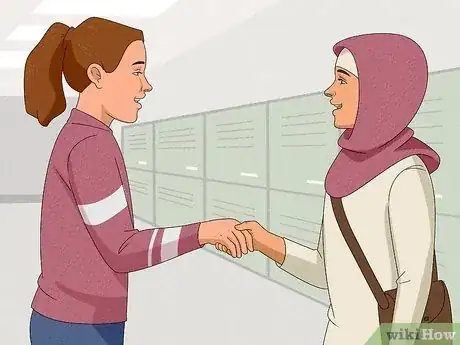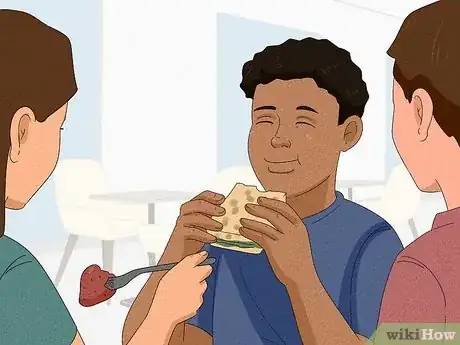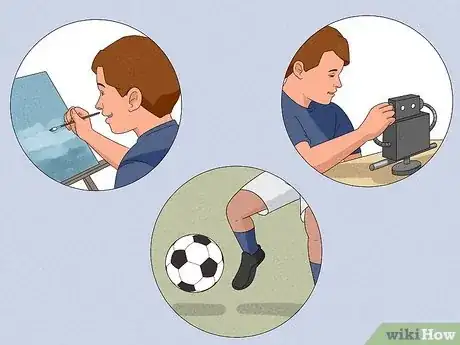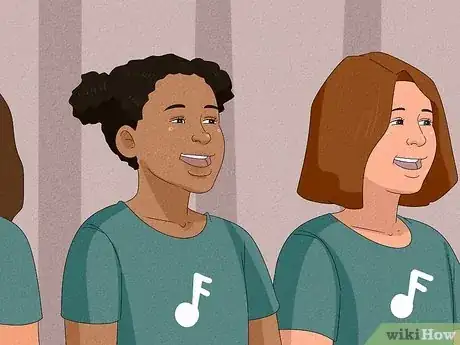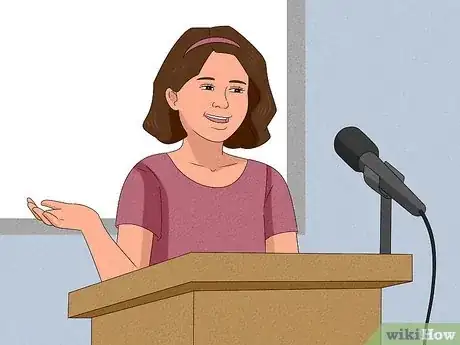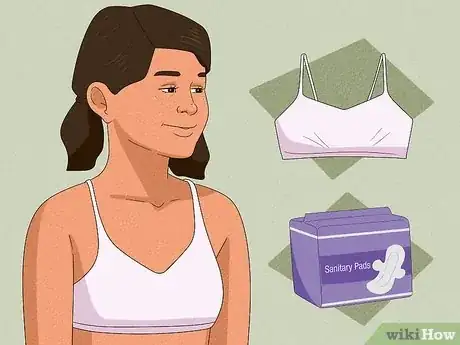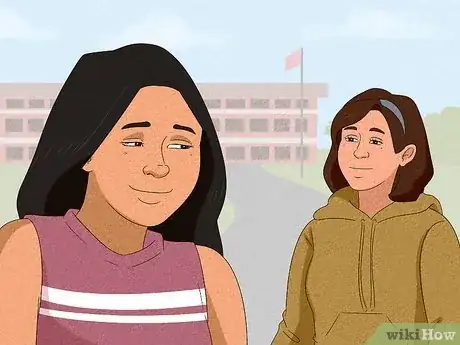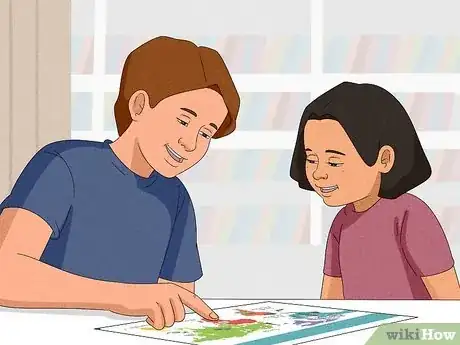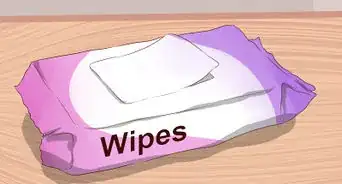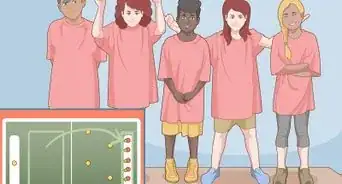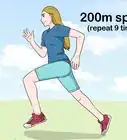This article was co-authored by Alicia Oglesby. Alicia Oglesby is a Professional School Counselor and the Director of School and College Counseling at Bishop McNamara High School outside of Washington DC. With over ten years of experience in counseling, Alicia specializes in academic advising, social-emotional skills, and career counseling. Alicia holds a BS in Psychology from Howard University and a Master’s in Clinical Counseling and Applied Psychology from Chestnut Hill College. She also studied Race and Mental Health at Virginia Tech. Alicia holds Professional School Counseling Certifications in both Washington DC and Pennsylvania. She has created a college counseling program in its entirety and developed five programs focused on application workshops, parent information workshops, essay writing collaborative, peer-reviewed application activities, and financial aid literacy events.
There are 8 references cited in this article, which can be found at the bottom of the page.
This article has been viewed 36,122 times.
Are you too afraid to start fourth grade? Do you think you are going to fail? Starting a new year is always hard, but you don't need to be afraid. There are lots of things you can do to make your year an easier one and to achieve the results you're after.
Steps
Making First Impressions
-
1Try not to be shy. If you are shy, people might not want to talk to you as much, and the year will just be harder. Making friends will be easier if you talk to others, and teachers will look at whether or not you are participating in class. Even saying "hi" to someone could start a new friendship. If you're trying to make friends, give everyone (even the people you don't like) a compliment every day. Try to keep in mind that your classmates are probably just as nervous as you are.[1]
-
2Don't be a teacher's pet. This does not mean that you should be mean or take advantage of your teacher's personality. You should still be nice, offer help, and participate in class. Do this often enough and you might become the teacher's pet without being viewed as a "goody-two-shoes". Not many people like the kid who always gets on the teacher's good side and gets all of the best grades. That makes people think you are a know-it-all or a show-off, which makes the teacher like you.
- Doing the right thing is always good as long as you aren't acting like a show-off.
- You may end up with a teacher that you won't like. Try to do your best to give her/him a chance. Maybe, if you get to know them better, you'll see that they're a lot cooler than you originally thought. If, for some reason, you still aren't their biggest fan, don't make a big scene about it. In most cases, you'll only have to deal with them for a year, so just make the best of the situation. Whatever you do, don't spread rumors about your teacher. They will most likely get back to her/him, and she/he won't be any more likely to treat you kindly.
- At the end of the day, they're your teacher and you need to respect them. If you like your teacher, then it's really easy to respect them! Although some fourth-grade teachers can be strict, others can be really nice.
Academics in Fourth Grade
-
1Review fourth grade math concepts. fourth grade math introduces a variety of new concepts, from 3D shapes to mixed numbers and fractions. Reviewing these concepts that you are currently learning is important. You will need to understand these concepts to do well on homework and tests. If you have struggled in third grade math, you may find fourth grade math to be very hard. In this case, ask for help frequently and get tutoring help. The third, fourth, and fifth grades are common years that kids need tutors, as this is when the curriculum gets more challenging.
- For number-related math, go over rounding numbers to the hundreds and thousands places, multiplying 2-digit numbers, dividing by 2-digit numbers, and comparing fractions.
- If you're learning advanced curriculum (which is common in private schools), review adding and subtracting decimal numbers, multiplying and dividing fractions, adding and subtracting mixed numbers, and using exponents and square roots.
- For fourth grade geometry, review the definitions of a line, point, segment, and a ray. You should also review classifying triangles and quadrilaterals.
- If you're learning advanced curriculum (which is common in private schools), review classifying angles, relationships between lines (parallel and perpendicular lines), and classifying polygons.
-
2Review fourth grade grammar and writing concepts. Language arts concepts are the same if you're in a public school, as all public schools in the U.S. follow the Common Core curriculum. If you're in a non-public school, the curriculum may be slightly altered or more challenging. You will learn a few more grammar concepts and practice writing longer essays for science fair or a project in history class.
- Review subject-verb agreement and use basic punctuation for grammar. By this point, you've probably learned a lot of basic grammar rules, so you don't have that many new concepts to learn. You may also learn about similes, metaphors, and idioms. [2]
- For writing, practice writing a report (this can help with your science fair if your school has one!) and persuasive essays if you can. You should also practice writing in sequence, using transition words like "Firstly", "Next", "In addition", and "Last but not least" in your writing. These will help if you're teaching younger kids something for a project or a biography, where you'll have to list the person's life from early childhood to their career, accomplishments, and death.
-
3Review fourth grade reading and vocabulary. Reading and vocabulary are related because the more vocabulary you learn, the more books you'll understand. Most fourth graders are reading chapter books by now, and they may be more interested in suspenseful, page-turning stories rather than straightforward, short stories with boring, cliché endings. You will also have a weekly spelling or vocabulary list (or both) weekly like in previous grade levels.
- For reading, read chapter books and kids' news articles. Books such as Frindle by Andrew Clements, The Bridge to Terabithia, The One and Only Ivan by Katherine Applegate, Tales of a Fourth Grade Nothing by Judy Blume, Count Me In by Varsha Bajaj, Moo by Sharon Creech, and Front Desk by Kelly Yang are great reads for 4th grade [3] .
- If you want to read classics or older books, The Legend of Sleepy Hollow by Washington Irving, Robin Hood, The Hobbit by J.R.R. Tolkien, Matilda by Roald Dahl, Charlie and the Chocolate Factory by Roald Dahl, Treasure Island by Robert Louis Stevenson, and Robinson Crusoe by Daniel Defoe are cool choices for older novels.
-
4Review fourth grade science. Science curriculum varies from state to state and school to school, but the topics taught are similar. Basic biology, physics, and chemistry will be taught. Fourth grade science may not really relate to what you've learned last year in third grade, but you will still remember some related concepts from even earlier years applied now. In elementary school, these will just be called "Animal Science", "Physical Science", and "Earth Science". You can review topics relating to the human body or classifying types of rocks. It depends on the school.
- For biology/animal science, review human body systems. You will usually learn important ones such as the circulatory system, respiratory system, and the digestive system. You could also review the classification of animals into the following categories: mammals, birds, amphibians, reptiles, and fish. [4]
- For Earth science, you could review weather patterns and analyze weather forecasts. You could also touch up on classifying rocks (igneous, sedimentary, and metamorphic) and understanding how volcanoes and mountains form. You may also learn about the water cycle and natural disasters such as earthquakes, hurricanes, and tsunamis.
- For physical science, you may learn about mixtures. Other lessons in physical science include the states of matter and physical and chemical changes.
-
5Review fourth grade history. If you're in the U.S., you'll usually learn more about American history and how the U.S. formed. You may also learn about the American government and how U.S. politics was made back in the 18th century. You'll cover the American Revolution and prominent historical figures. You may also travel back hundreds of years in time to the Middle Ages, a time of serfs, jousting, and castles. This is also commonly taught in 4th grade. [5]
- Many schools teach about the Middle Ages in fourth grade. You may learn about how serfs worked on manors, what medieval people did for fun, and important historical figures in the Middle Ages such as William I (William the Conqueror) and Charlemagne.
- Review your history textbook for information on the American Revolution, the Founding Fathers, Great Britain at the time of the revolution, and the first few presidents of the U.S. (George Washington, John Adams, and Thomas Jefferson).
Acing Fourth Grade Academics
-
1Take notes. Yes, your teachers may not require notes from elementary school students. But it's still great to use a thin notebook to take notes. The most important subjects to take notes on are math, science, and history. You can take notes in language arts too, although the notes will be shorter, as you will only need to take notes for parts of speech or when reading a book for school. If you're reading an assigned book (e.g. The Bridge to Terabithia or Robin Hood), your teacher may require reading notes on the characters, plot, setting, and the main ideas of each chapter of the book. Jot down key terms and definitions. You should also provide a few examples.
- For math, draw diagrams and do a few example problems in your math notebook. If your school tells you to buy your own school supplies, buy a graph paper notebook. This will make it easier to line up numbers and draw shapes on coordinate planes. Your bar and line graphs will also be neater.
- For history, write down key events that happened, who was involved, and when they happened. For example, you could write, "12/16/1773 – Boston Tea Party – colonists dump 3 shiploads of British tea".
- Don't write complete sentences for your notes! Unless you're writing down example sentences for grammar, writing whole sentences will waste your time when you want to write down as many points as possible. It will also tire out your hand faster. Use abbreviations, semicolons, bullet points, and fragments of sentences to make your notes concise. Remember, you're not copying down the whole textbook!
-
2Study for tests. During earlier grade levels such as third grade, second grade, first grade, and kindergarten, you probably did not study for tests, or at least not as much. Since early elementary school concepts are easier to understand and the fact that there is less material, kids often have an easy time getting most of the information in their brains. Starting from third grade, tests may become harder to ace without studying for at least 10 minutes daily. Addition facts are easy to memorize, but multiplying fractions and classifying angles? That information is harder to retain in your brain over a long period. You should start studying for tests a week before they are announced.
- Another benefit of studying is that you are prepared for pop quizzes. If you only study if you have a test, you may not be prepared if there is a surprise test. If you already study with or without tests, it becomes a habit, and you already know the information.
-
3Pay attention and participate when the teacher speaks. If you do not pay attention, you're going to have a very hard time. Teachers frequently call on people who zone out or are distracted. When they call on you, you may not know the answer. You could've also been so distracted that you didn't hear the teacher call on you. This will lead to embarrassment and awkward stares from classmates. Plus, participating in class boosts your participation grade. Even if you're not sure, raise your hand, as this is a great learning opportunity.
- If you don't understand something, raise your hand and ask a question, or simply ask the teacher to repeat what they said.[6]
Social Life
-
1Be friendly to everyone. This is why someone who always frowns or annoys people will not get many friends. People who seem uninterested in talking to other people (the kids who always sit alone and do not contribute to conversations) will not get many friends either. Most kids like a friendly person that will help them through challenges and talk about their day with them. Say hi to someone while on the way to class, help someone with their homework, help clean up the classroom after class, or help someone when needed. These are all ways to be friendly. Doing this will earn you at least a few friends.
- Contrary to what some kids think, being a big bully/mean girl does not earn you friends. Sure, they may seem like friends to you on the outside, but on the inside, they may be as mean as you. They might make friends with you just to gain popularity, so they may fight with you to get "most popular". They can also make friends with you to get closer to someone that is close to you.
- If you have an enemy in school (or even in the same class as you), it can be difficult to be nice to them. You'll have to pretend for this one- just show basic politeness for them, and don't help them with anything. If they ask, just claim that you're busy or you're not sure how to help them.
-
2Hang out with classmates during recess and lunch. These are the best times to hang out! If you don't stay in extended care or attend any clubs, you can hang out with your friends during recess and lunch. These are the times when you're free to talk and laugh as loudly as you want. You can even talk while you are going to the bathroom with them. Yes, some kids can talk anywhere; during class, in the bathroom, at lunch, during clubs/extended care, and on the bus to/from school if they use the bus to get to school. That doesn't guarantee that other kids like them though; they may make others annoyed or distracted from their schoolwork. So, only chat during appropriate times. Save conversations for breaks, lunch, and after-school times!
- Don't try to whisper to your buddy during class or during an inappropriate time (e.g. during an assembly or during a trip to the principal's office). That may get you into trouble, so don't do it often. If you do this too often, your reputation may downgrade. You may be known as "too chatty" or "a distraction".
-
3Join multiple clubs in your school. Elementary schools often have a variety of clubs for kids to join. These clubs demonstrate your interests and help you gain friends that share the same hobbies as you. For example, if you join the art club, you will find art lovers all over the club. If you attend the robotics club, a bunch of AI enthusiasts will be there. If you join 2 or 3 of these clubs, you will find more diverse friends with a bunch of different interests. This makes others feel that you are open to kids of all different beliefs and cultures, which will earn you more friends.
- During a club, you can talk to the people sitting next to you. If you're making a project (say, for robotics), discuss with the people next to you, for example, how to code the robot to make it move in a circle 3 times.
-
4Do something outside of your comfort zone. As a young kid a couple of years ago, you may haven't taken enough risks. Adults and older kids around you when you were little may have told you that "little kids shouldn't do this" or "you won't understand anything from this, as you're little" or "do this when you're older". As you're in 4th grade already, you may be 9 or 10 years old. You are technically considered a "tween" already, which includes the ages between childhood and teenhood (ages 8-12). As you are a big kid in elementary school, you should try out some new things; maybe something you were too scared to do in 3rd, 2nd, or 1st grade or a new hobby.
- Join more clubs. As you're older now, you may want to explore your interests. Instead of blindly going to a club with your friends even though you aren't interested in it, join something you really want to join without being worried about judgment. You may even find a new interest that you enjoy, such as singing in the choir or coding robots.
-
5Join student council. When you were in first, second, or third grade a couple of years ago, you and your classmates may have been banned from participating in the student council, as you were too young and immature to actively understand the school environment and what you were doing. If you're in third, fourth, or fifth grade, your school may allow you to participate in the student council. There are a few positions in the student council that you can run for: class representative, secretary, vice president, and president.
- If you're running for any of these positions, you will need a speech and possibly a campaign poster.
- Write your name in large letters on your poster and make it colorful for others to notice it and actually read what it says. You could also think of a creative slogan. For example, Whig party delegates William Henry Harrison and John Tyler had a catchy slogan in the 1840 U.S. elections; "Tippecanoe and Tyler Too", which was originally published as "Tip and Ty". [7]
- For your speech, start with an interesting hook. This could be an inspiring quote, something interesting about you, or traits that other world leaders had that made them amazing. Next, write down a few reasons why you would make a great leader. Then, provide examples of you being kind, responsible, respectful, caring, intelligent, etc.
- You should have around 5 paragraphs for your speech; the first paragraph being the intro, the second one being the 1st reason, the third one about the second reason why kids should vote for you, the fourth one being your third/last reason, and the fifth one as a summary/conclusion.
Easing Common Worries in Fourth Grade
-
1Deal with puberty. Many kids, especially girls, start puberty around the ages 9-10. Girls start puberty earlier than boys in general, so more girls are developing in fourth grade than boys. Boys may still look like tall 7 and 8-year-olds, whereas some girls may be mistaken for a 12-year-old or a young teenager. This is normal, as everyone develops at different rates. Puberty can be awkward and embarrassing to deal with, so here are some tips!
- Get a training bra for developing breasts. One of the early signs of puberty in females is breast growth, so if you feel nickel-sized bumps on each of your breasts, it may be time to buy one.
- Deal with a period in elementary school. If you get a period in elementary school, you are not abnormal or strange. It's just that you started earlier than the average age of menarche (the first period), which is the age of 12.
- Remember to not back down or feel embarrassed, even when immature kids tease you about your period. Everyone gets it, so when you go to middle school, many more girls will go through the same things as you.
-
2Deal with friendship problems. As you go into fourth grade, friendships can get complicated. Friends grow apart and change over time, so there will be some disagreements. Your friend may get bossy at times or disagree with you on small things. Your friend may also be dealing with a whole lot of stress and pressure from people around them. They may also mature faster than you, making you feel like they have changed. You'll need to learn some conflict resolution skills if you haven't yet.
- Try to understand their point of view and explain your point of view to them.
- Make up a compromise if you still cannot solve the argument. You may want to get a mediator (like a teacher) if the argument is heated.
-
3Find ways of coping. There will always be people that you have a hard time dealing with. You will find this throughout your school years. From annoying classmates to angry teachers and bullies, you'll need some coping strategies to deal with them. You're getting older, so it's best to handle some situations by yourself instead of solely relying on your parents or teachers to help you. [8]
- If you have a mean teacher, do not give up. Try your hardest and show some respect for the teacher. They might lighten up with you. If they continue to unfairly treat you, talk to your parents and the principal about the situation.
- If you are getting yelled at, don't be embarrassed. Besides, nobody can be perfect, and now you'll know to learn from your mistakes.
- If a kid tries to unfairly get you in trouble, talk to the teacher or an adult to explain what happened, but don't get revenge!
-
4Cope with being one of the older kids in your elementary school. Fourth graders are usually seen as the older kids in elementary school, along with the fifth graders (who are the older kids or the oldest in the whole school). Because of this, teachers will expect you to understand the rules and expectations of the class. They will not allow you to make up silly excuses on why you did something, unless it really did happen. For example, they will not believe you if you say, "I was busy" frequently as an excuse for not doing your homework.
- The teachers will want you and your classmates to act as role models for the third graders, second graders, first graders, and kindergartners, so do not act immaturely.
- Make friends with some mature fifth graders to be seen as more mature. They could help you cut down on your bad habits and transform you to become more mature.
- If you have younger siblings, your parents may tell you to help look after them. Your younger siblings (no matter if they're in third grade, second grade, first grade, kindergarten, pre-k, or preschool) will likely look up to you as a mature, responsible role model.
Expert Q&A
-
QuestionThere are so many subjects to keep track of in fourth grade! How can I organize all my notes so I can stay on top of my classes?
 Alicia OglesbyAlicia Oglesby is a Professional School Counselor and the Director of School and College Counseling at Bishop McNamara High School outside of Washington DC. With over ten years of experience in counseling, Alicia specializes in academic advising, social-emotional skills, and career counseling. Alicia holds a BS in Psychology from Howard University and a Master’s in Clinical Counseling and Applied Psychology from Chestnut Hill College. She also studied Race and Mental Health at Virginia Tech. Alicia holds Professional School Counseling Certifications in both Washington DC and Pennsylvania. She has created a college counseling program in its entirety and developed five programs focused on application workshops, parent information workshops, essay writing collaborative, peer-reviewed application activities, and financial aid literacy events.
Alicia OglesbyAlicia Oglesby is a Professional School Counselor and the Director of School and College Counseling at Bishop McNamara High School outside of Washington DC. With over ten years of experience in counseling, Alicia specializes in academic advising, social-emotional skills, and career counseling. Alicia holds a BS in Psychology from Howard University and a Master’s in Clinical Counseling and Applied Psychology from Chestnut Hill College. She also studied Race and Mental Health at Virginia Tech. Alicia holds Professional School Counseling Certifications in both Washington DC and Pennsylvania. She has created a college counseling program in its entirety and developed five programs focused on application workshops, parent information workshops, essay writing collaborative, peer-reviewed application activities, and financial aid literacy events.
Professional School Counselor Develop a color-coded system! Buy a differently colored folder for each subject and keep the right notes in each one. In terms of knowing how to manage your time when you have so much to keep track of, purchase a planner and write down each assignment that each of your teachers gives you. Having visual reminders of your homework and separating your notes will help you tackle one subject at a time.
Develop a color-coded system! Buy a differently colored folder for each subject and keep the right notes in each one. In terms of knowing how to manage your time when you have so much to keep track of, purchase a planner and write down each assignment that each of your teachers gives you. Having visual reminders of your homework and separating your notes will help you tackle one subject at a time.
Warnings
- Don't think a teacher is mean just because people say so. If you hand things in on time and don't get in trouble a lot, you might find that your teacher isn't so mean.⧼thumbs_response⧽
- Don't tattletale/snitch, the teacher will never believe you if you do.⧼thumbs_response⧽
- If you have a mean teacher, tell your parents. Don't leave this sort of situation un-handled, as things could get worse.⧼thumbs_response⧽
References
- ↑ https://young.scot/get-informed/national/a-shy-persons-guide-to-making-friends-at-school
- ↑ https://www.ixl.com/ela/grade-4
- ↑ https://www.commonsensemedia.org/lists/best-books-for-fourth-graders
- ↑ https://www.ixl.com/science/grade-4
- ↑ https://www.weareteachers.com/25-things-every-4th-grader-needs-know/
- ↑ https://kidshealth.org/en/teens/back-to-school.html?WT.ac=ctg
- ↑ https://www.encyclopedia.com/history/dictionaries-thesauruses-pictures-and-press-releases/tippecanoe-and-tyler-too
- ↑ https://kidshelpline.com.au/teens/issues/coping-emotions
